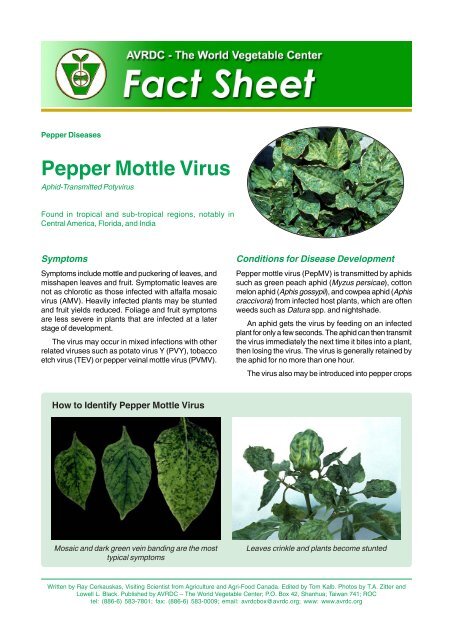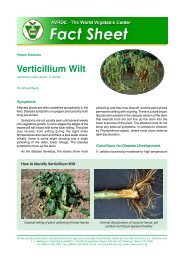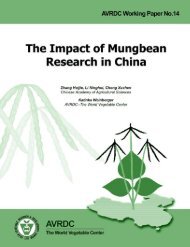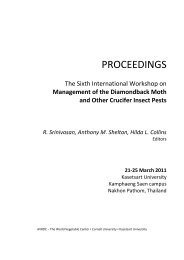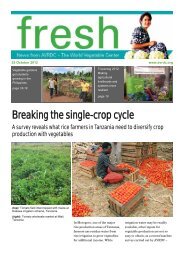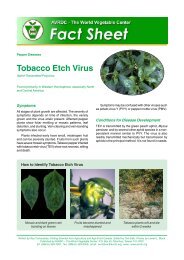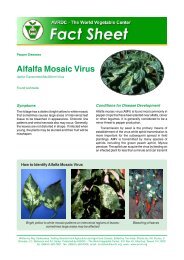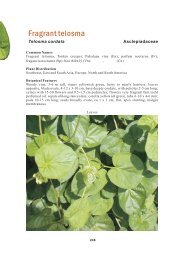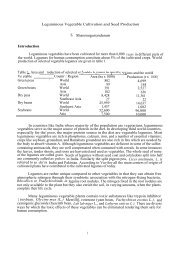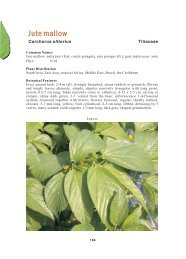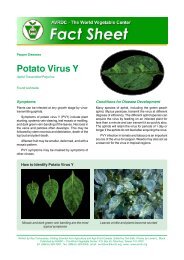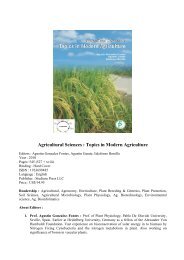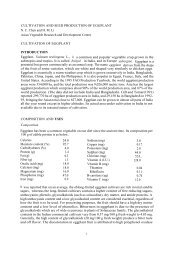Pepper mottle virus Aphid-transmitted potyvirus
Pepper mottle virus Aphid-transmitted potyvirus
Pepper mottle virus Aphid-transmitted potyvirus
- No tags were found...
Create successful ePaper yourself
Turn your PDF publications into a flip-book with our unique Google optimized e-Paper software.
<strong>Pepper</strong> Diseases<strong>Pepper</strong> Mottle Virus<strong>Aphid</strong>-Transmitted Poty<strong>virus</strong>Found in tropical and sub-tropical regions, notably inCentral America, Florida, and IndiaSymptomsSymptoms include <strong>mottle</strong> and puckering of leaves, andmisshapen leaves and fruit. Symptomatic leaves arenot as chlorotic as those infected with alfalfa mosaic<strong>virus</strong> (AMV). Heavily infected plants may be stuntedand fruit yields reduced. Foliage and fruit symptomsare less severe in plants that are infected at a laterstage of development.The <strong>virus</strong> may occur in mixed infections with otherrelated <strong>virus</strong>es such as potato <strong>virus</strong> Y (PVY), tobaccoetch <strong>virus</strong> (TEV) or pepper veinal <strong>mottle</strong> <strong>virus</strong> (PVMV).World Vegetable CenterConditions for Disease Development<strong>Pepper</strong> <strong>mottle</strong> <strong>virus</strong> (PepMV) is <strong>transmitted</strong> by aphidssuch as green peach aphid (Myzus persicae), cottonmelon aphid (Aphis gossypii), and cowpea aphid (Aphiscraccivora) from infected host plants, which are oftenweeds such as Datura spp. and nightshade.An aphid gets the <strong>virus</strong> by feeding on an infectedplant for only a few seconds. The aphid can then transmitthe <strong>virus</strong> immediately the next time it bites into a plant,then losing the <strong>virus</strong>. The <strong>virus</strong> is generally retained bythe aphid for no more than one hour.The <strong>virus</strong> also may be introduced into pepper cropsHow to Identify <strong>Pepper</strong> Mottle VirusMosaic and dark green vein banding are the mosttypical symptomsLeaves crinkle and plants become stuntedWritten by Ray Cerkauskas, Visiting Scientist from Agriculture and Agri-Food Canada. Edited by Tom Kalb. Photos by T.A. Zitter andLowell L. Black. Published by AVRDC – The World Vegetable Center; P.O. Box 42, Shanhua; Taiwan 741; ROCtel: (886-6) 583-7801; fax: (886-6) 583-0009; email: avrdcbox@avrdc.org; www: www.avrdc.org
on infected transplants, and then spread by aphids tonearby weeds, which act as future reservoirs for the<strong>virus</strong>.PepMV is mechanically-<strong>transmitted</strong> by plant sapbut not by simple contact between plants. PepMV canbe <strong>transmitted</strong> by grafting but not by pepper seed.ControlResistant varieties are available. Check with yourextension agent for resistant cultivars that are availablein your region.Use of insecticides during the growing season isineffective; however, control of aphids early in the seasonprior to seeding or planting the field, to reduce initialinfection and spread, may be useful. Spray weedsbordering the field with an aphicide prior to seeding orplanting the field. This will prevent the aphids from movingto other plants and infecting them when subsequentweed control is started. Destroy all annual weeds inthe field, including those in ditches, hedge or fencerows,and other locations.Use a 32-mesh or finer mesh netting to excludeaphids from transplants before they are set into thefield. Avoid planting peppers close to establishedtomato, tobacco, and pepper fields since these fieldsmay harbor aphids. Plant earlier to avoid high aphidpopulations that occur later in the season.Other control measures include scouting fields forthe first occurrence of <strong>virus</strong> disease. Where feasible,infected plants should be pulled up and destroyed, butonly after spraying them thoroughly with an insecticideto kill any insects they may be harboring.Reflective mulches may be used to repel aphids,thereby reducing the rate of spread of aphid-borne<strong>virus</strong>es. <strong>Aphid</strong> populations should be monitored earlyin the season and mineral oil or other insecticidetreatments applied when needed. The mineral oil sprayswill reduce the frequency of transmission of the <strong>virus</strong>by the vector and thereby delay development of thedisease in the pepper crop.For more information on the production ofpepper and other vegetables, go to.AVRDC Publication 04-5912004


